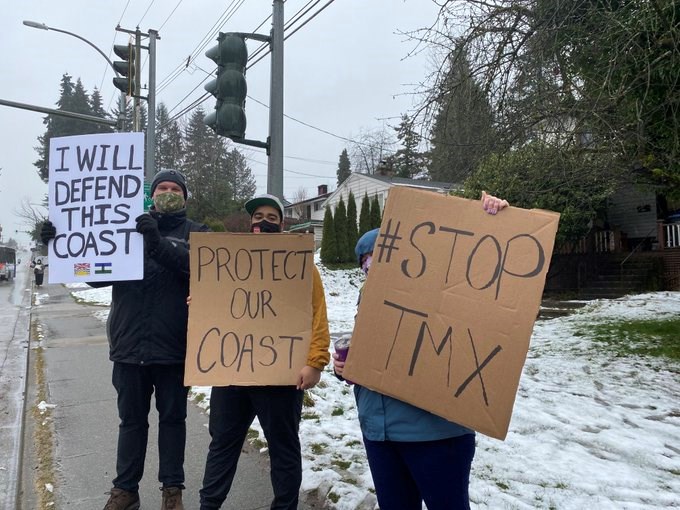Some New West residents celebrated Family Day by taking a stand against the Trans Mountain pipeline expansion project.
A contingent of local residents spearheaded the #FamiliesfortheFuture event to highlight their concerns about the pipeline expansion, including safety risks, environmental impacts and danger of leaks or explosions. Participants toured portions of the pipeline route, held signs showing their opposition to the project and posted selfies on social media.
“It was a cold, drizzly Family Day but dozens of people and families of all sorts braved the weather across the Lower Mainland to show their concern on social media about the Trans Mountain pipeline expansion project,” participant Maya Russell said in an email to the Record.
In recent months, Sapperton resident Ruby Campbell has reached out on social media to see if other residents were concerned about the project and wanted to learn more. Some suggested they could still try to convince the federal government to stop construction of the pipeline expansion.
“A lot of people said, ‘it’s not too late – only 20% of it is built’ and ‘maybe we can make this an issue.’ If there is a federal election, that would bring awareness to it again,” she told the Record. “It really is going to impact our waterways. Trees are going down.”
The group includes “everyday families” who will be impacted by the project and want to do what they can to stop it from being built, Campbell said, and includes people supportive of various political parties.
Community-based organizations including New West Environmental Partners, Colony Farm Park Association and Burnaby Residents Opposed to Kinder Morgan Expansion supported the group’s plans for the #FamiliesfortheFuture events. On Family Day, people attended events at three locations near the pipeline route – Lower Hume Park, Stoney Creek in Burnaby and Colony Farm Regional Park in Coquitlam.
What's at risk?
Campbell said she often walks along the Brunette Fraser Regional Greenway, which is on the pipeline route and is an area that’s home to endangered species.
“There are endangered species in the Brunette, Fraser River and Stoney Creek that are part of our ecosystem that are going to be destroyed,” she said, when asked about her concerns. “The trees – the destruction of the trees.”
Last month, City of Burnaby officials were disappointed when the Canada Energy Regulator (known as the National Energy Board until August 2019) determined that Trans Mountain is not required to obtain city permits to remove more than 1,300 trees along the route in Burnaby. Burnaby’s tree bylaw states that protected trees – those with diameters of 20.3 centimetres or greater – cannot be damaged or removed without a permit from the city, but the CER panel determined that section of the tree bylaw doesn’t apply to Trans Mountain’s work.
“It’s not just 1,300. It’s going to be more because they only measure trees of a certain diameter. It’s going to be more trees. When I think of that I am horrified,” she said. “You look at Texas right now with the snow storm they have; that is climate change. When you look at trees being removed, my gosh, that’s baseline what we need for the environment. It’s not just esthetics.”
Campbell said she is also concerned the federal government bought the pipeline with public funds, after Kinder Morgan decided it wasn’t going to be economically feasible for it to build the pipeline, at a time when she believes the government should be divesting from fossil fuels.
The local residents are continuing to meet weekly (virtually) and hope to make it an election issue, should a federal election be called in the coming months.
“It really is grounded in community and grounded in people who happen to be at a point in their life where they have this time to bring awareness,” Campbell said of the group. “This is about our community. It is not about winning elections. It’s about supporting whoever our public official is that can help to stop this.”
Although construction of the pipeline is already underway, opponents believe there’s still a chance to stop the project.
“It can never be too late to do better,” Campbell said.
With files from Dustin Godfrey
Follow Theresa McManus on Twitter @TheresaMcManus
Email [email protected]


